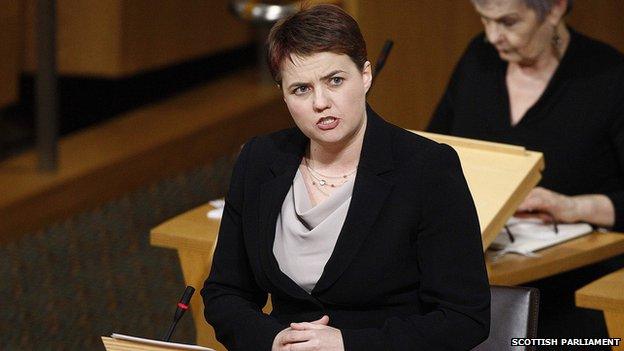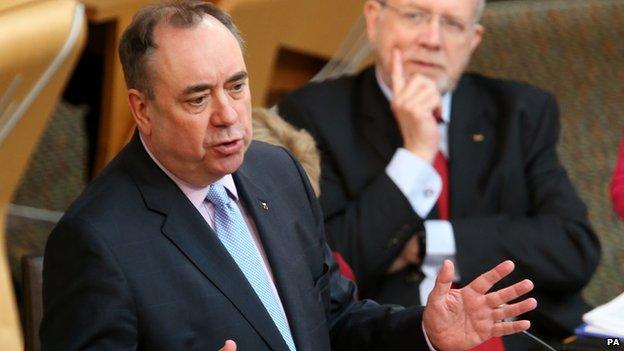A tale of two catchphrases
- Published

Conservative leader Ruth Davidson challenged the first minister on the start-up costs of an independent Scotland
Permission to speak sir! Just like that! Computer says No. Ooh Betty! I'm free! Ooh, you are awful….but I like you! The only gay in the village. I don't believe it!
Recognise them? Classic comedy catchphrases. Bet you can source them all. But, before you write in, it's not a quiz and there's no prize.
Or go back further. "It's being so cheerful as keeps me going". Or "can you hear me mother?" Recognise them. No? Mona Lott from ITMA and Sandy Powell, respectively.
What do they all have in common? At the time they were used, they would all have been instantly recognised by the large audiences who tuned in to the comedy shows in which they featured.
In themselves, they have no comic content. It's in the delivery ("it's the way I tell 'em!") - but, more than that, they become funny because they are familiar. We laugh because others laugh. We want to be in the gang along with our chums. It's about social cohesion.
There was a touch of that phenomenon on display at Holyrood today as Ruth Davidson of the Tories challenged the first minister about the start-up costs of an independent Scotland.
Remember the background? The Treasury had floated a figure of £2.7bn, supposedly based upon work by Professor Patrick Dunleavy of the LSE.
'Misrepresented'
Said academic protested that his work had been badly misrepresented and the figure should not be trusted in any way. Treasury duly said that they were not offering the figure as their own but as an illustration of data that was out there.
Alex Salmond seized upon the issue and hammered home, repeatedly, the message that the much wider Treasury analysis of the overall cost of independence could not be trusted. He delivered a comparable message when another prof, Robert Young from Canada, voiced disquiet about an interpretation placed upon his work.
Which leaves a range of questions for the Treasury to answer. And one aimed at Scottish ministers. If you are saying the Treasury costings are mince, what are your figures?
If you will recall, that particular question was directed at John Swinney, the finance secretary, on Good Morning Scotland yesterday. Mr Swinney repeatedly sidestepped the inquiry, preferring to talk about longer-term growth under independence.
At yesterday's Scottish government briefing, Mr Salmond was asked again. He quoted Prof Dunleavy once more to the effect that a more reasonable estimate might be around £250m. That would do for A. Salmond.
Which brings us to today. Ruth Davidson had a go at prising a precise government figure from Mr Salmond as to the cost of setting up a new state. Not the running costs, the start-up price.
'Guesstimate'
Unfortunately for Ms D, she prefaced her remarks by referring to Prof Dunleavy, Alex Salmond's favourite academic.
And, just as with comedy catchphrases of old, the very mention of Dunleavy was enough to cause hysterics on the SNP back benches.
"Professor Dunleavy…", she began. They roared and laughed. She said Dunleavy!! Ms Davidson tried again. Mr Salmond's figures were a "guesstimate". They yelled more loudly: that was the very charge levied against the Treasury - as a result of the Dunleavy intervention! More Dunleavy!!

First Minister Alex Salmond seized upon set-up figures used by the Treasury which were 'badly misrepresented' according to the academic who originally devised them
"I find it worrying…" continued Ms Davidson. By now, the backbenchers were lolling helplessly in their seats and slapping each other's backs. "Paperclip economics..." Stop, they cried, stop.
In response, a bravura performance of satire from the FM. He said he would seek an early chat with both Prof Dunleavy and Prof Young. They were good guys he would want to meet. And to Ms Davidson? Advice to reshape her questioning strategy.
But, amid all the laughter, had he answered the question about start-up costs? Not in terms, no. And so Willie Rennie of the Liberal Democrats tried again. By now, the laughter was so endemic that no catchphrase was needed. He just had to stand up. "Come on, behave!" That from the presiding officer.
Mr Rennie reminded the chamber that a leaked cabinet document, prepared by John Swinney, had indicated in 2012 that work was under way in calculating the transition costs of independence. What happened to that work, he inquired.
In response, Mr Salmond talked not about start-up costs but about the 15-year projection for growth upon which was based his argument that, under independence, people in Scotland would end up £1000 better off each per year.
Negotiations
The "miserable, destroyed" analysis of the Treasury had been shredded, according to the FM.
On to the media briefing with the SG after FMQs. Each and every inquiry from the newspapers, from me, from all journalists attending, concerned the start-up costs.
These, we were assured by the FM's chief spokesperson, had been subsumed within the wider White Paper. They were featured in Chapter 10.
On consulting said chapter, we find that "a number of factors will influence the size of the one-off investment that Scotland will make in the transition to independence".
These include negotiations between Edinburgh and London over carving up UK assets and the options chosen for service delivery, involving reform.
That, said the FM's spokesman, is why there is no costing available from SG. "There is no document," he opined, secret or otherwise. (Opposition leaders are demanding publication of a supposedly secret dossier, citing John Swinney's leaked promise of work on this front.)
Again from FM spokesman, we learn that any work carried out in government on this material informed the outcome in the White Paper.
But how, I asked, can the FM be certain that the Treasury estimate is nonsense and the second Dunleavy figure reasonable if no final costing has been done by the Scottish government?
Because many of the institutions of governance already exist. Because there is a tax organisation - Revenue Scotland - already in preparation. Because the SG operates as a unit, not as distinct costly departments. Because the new teams which would be needed are relatively few in number: foreign affairs, defence, work and pensions, social security.
So, says the Treasury, it would all happen "just like that". The SG response: "am I bovvered?"